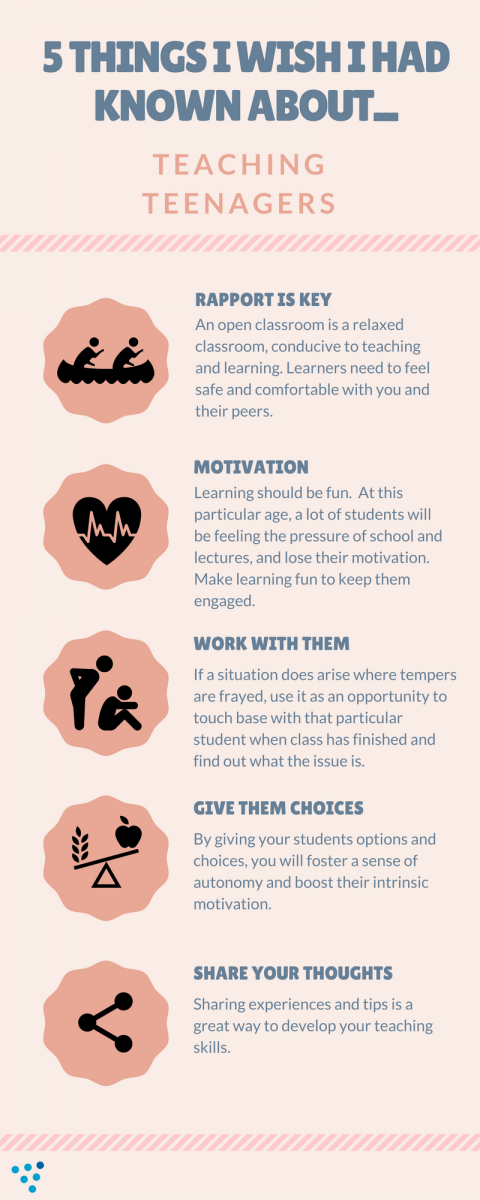15th November 2016
Just do the thing...
The advice I got from a colleague early on in my teaching career. Her advice while not exactly motivating, ended up being the best advice I was given for everything, not just teaching.

At the time I was struggling to motivate a class of teenaged learners and went home each day feeling like a failure. Even back then, I knew high school students were not my preferred age group, in fact I didn’t want anything to do with them. All my experience had been with much younger learners, until the day I was asked to take over a class of teenagers for the rest of term.
I think this is something all teachers face. We all have that one age group, the one we hate, we can’t stand teaching because we just don’t get them or had terrible experiences with in the past. Some of us even go so far as to avoid teaching that age group. Others suffer in silence, making themselves sick with worry and fear.
So how did I face this fear?
1. Work hard on building rapport with teenagers
As with all learners, successful teachers engage their learners by finding out what makes them tick. Rapport is arguably one of the most important aspects of the classroom. Kids at this age face pressure of all kinds, peer, self-confidence, family, school, etc. Build classroom rapport early on by having a lot of mingle activities where they have to talk to lots of different people, and constantly changing seating patterns and pairs (on a daily basis), so that cliques can’t form and so all students feel comfortable talking to everyone. An open classroom is a relaxed classroom, conducive to teaching and learning. Learners need to feel safe and comfortable with you and their peers. Make a point of stating so at the beginning of term, that your classroom is one of inclusion, safety and a place for everyone to communicate without fear.
2. Motivation for teenagers is a huge factor
Teenagers are notoriously hard to motivate. What works well with one class, doesn’t with another. From 12-15 years of age, motivation is often extrinsic as English is still often a compulsory subject in most places. From 16 upwards, classrooms tend to be more relaxed, as motivation becomes intrinsic (when English is no longer compulsory and learners are of their own volition). For those learners who struggle with motivation, shouting and losing your temper will have no effect. Instead, try using positive reinforcement http://hongkongtesol.com/blog/2016/10/5-ways-manage-behaviour-using-positive-reinforcement techniques. Find out what motivates your learners, is it having some extra time free at the end of the lesson to watch an English song on Youtube? Is it having personal time with the teacher? Is it through group work? Is it having a compliment paid to them in front of everyone, or written down on their handbooks? The key is to make sure you motivate everyone, both through class activity types and rewards, as well as personally. Make sure you use a variety of rewards to motivate learners or they will find it predictable and boring.
Another way to motivate your learners is to give them choices, for activities and tasks, where they can choose what they want to learn for that lesson. This is particularly nice when it’s the last lesson of the week or month, where there is a choice of gentle activities for them to unwind to. I used games on Friday afternoons and swapped them around every 20 minutes, e.g. Scrabble, Have you ever…? Charades, Monopoly, Pictionary, Trivial Pursuit and Taboo. Students looked forward to participating in these and the level of communication and motivation rose in the class.
Don’t ever forget that learning should be fun. At this particular age, a lot of students will be feeling the pressure of school and lectures, and lose their motivation. Make learning fun for them again to keep them engaged.
3. Work with them
As mentioned earlier, losing your temper is a surefire way to lose your class. When building rapport through personalized, mingling activities, or group / pairwork, give learners a chance to question you and find out more about you as a teacher. Crack jokes, share anecdotes, let them see you as a person. If a situation does arise where tempers are frayed, use it as an opportunity to touch base with that particular student when class has finished and find out what the issue is. Defuse the situation by letting them vent and sympathise with them, before working on solutions together.
4. Give teenagers choices
Being a teenager is incredibly difficult at times. Confidence for many students is an issue. By giving your students options and choices, you will foster a sense of autonomy and boost their intrinsic motivation. When the learning environment is collaborative, students will have a greater sense of involvement and achievement, as well as being able to police themselves and their peers. Choices can be given for different tasks, or who they want to work with for a particular task (on the proviso that they must have a different partner for the next activity, etc), as well as for classroom rules on behavior and learning.
Class contracts at the beginning of the school year can be a useful way to check behavior, where all the students must come up with their ‘sensible’ class rules. They all have to sign (including the teacher!) which enables them to be accountable for how they behave in class and with each other.
5. Share your thoughts, and let them share theirs
As a new teacher it can often be intimidating talking to other teachers in staff room. However, a good staffroom is one where advice is given freely and experiences shared. If you are finding it tough, talk to someone. Don’t be afraid, we have all been in that position. Sharing experiences and tips is a great way to develop your teaching skills. Teaching teenagers requires a repertoire of tasks, games and classroom management techniques which would take years to acquire through your own discovery, if you didn’t have the help of others. Sharing your experiences also has the added benefit of reducing stress. The very act of talking to another teacher of teenagers will relieve the burden, as you can be sure someone else has had a similar experience.
So yes, ‘do the thing’, it’s how you learn and become a better teacher. But it doesn’t mean you can’t enjoy the process and your learners at the same time. There will come a point (I promise you) where it suddenly all falls into place and you look around the classroom and see happy, motivated, communicative students and realise that you have ‘done the thing’, that hard thing you once feared, and you are now the maestro!



